Key takeaways:
- The evolution of rap music mirrors social change, moving from party beats to a platform for marginalized voices, with artists like Nas and Kendrick Lamar pushing deeper socio-political narratives.
- Nightclub venues are essential for nurturing artistic expression, providing a supportive environment that enhances local culture and the nightlife economy.
- Key features of nightclub performances include the electric atmosphere, spontaneity, and intimate artist-audience engagement, transforming performances into memorable experiences.
- Rap culture serves as a powerful catalyst for change, fostering community and inclusivity across diverse audiences, while addressing significant societal issues through music.

Understanding rap music evolution
The evolution of rap music is a fascinating journey that reflects social change and cultural shifts over decades. I remember the first time I heard the raw storytelling in Grandmaster Flash’s “The Message.” It struck me deeply, making me realize how powerful lyrics could convey real-life struggles and societal issues. Isn’t it intriguing how rap has transformed from the party beats of the early days to a platform amplifying voices that were once marginalized?
As the genre progressed, I found myself captivated by the intricate wordplay of artists like Nas and the poetic prowess of Kendrick Lamar. Their ability to weave personal narratives with broader socio-political themes invited listeners to engage more profoundly with the music. How does it feel to witness an art form evolve while simultaneously shaping public opinion? This evolution signifies not just an artistic shift but also a reflection of the times.
Moreover, the 90s with its East Coast versus West Coast rivalry offered a critical lens into the clash of identities within rap. I remember feeling the palpable tension in the air when artists took sides, something that added an engaging layer to the music. This rivalry, marked by the tragic losses of legends like Tupac and Biggie, shaped the genre’s narrative, reminding us that rap carries history, emotion, and a sense of community that is hard to replicate elsewhere. Isn’t it powerful how music can encapsulate not only individual stories but also collective experiences?
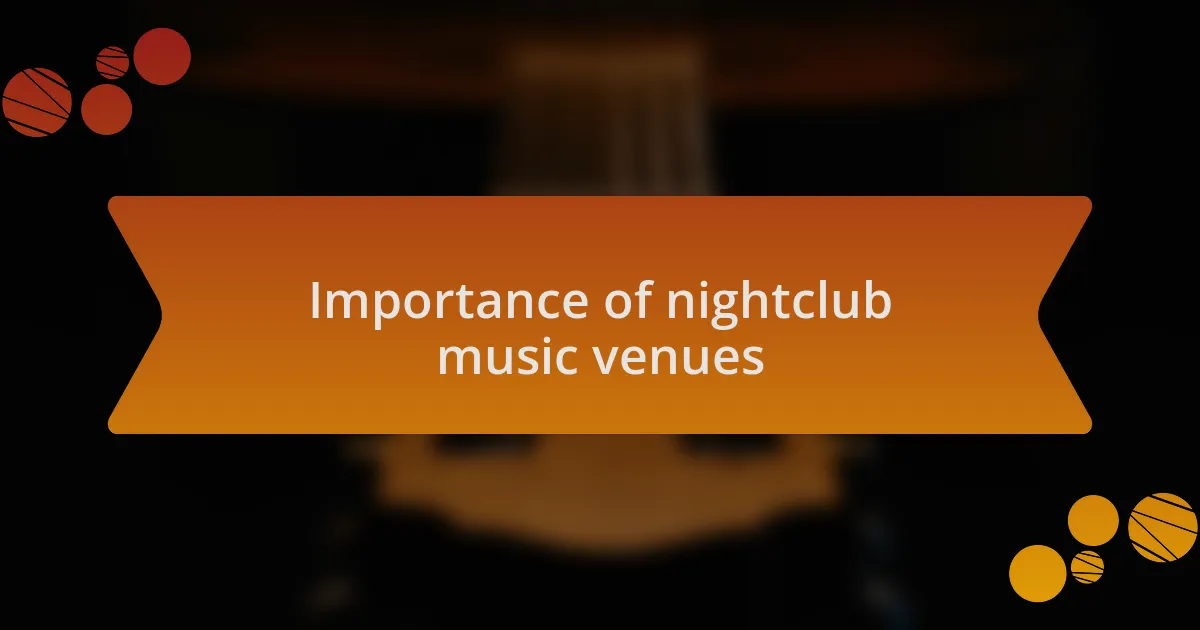
Importance of nightclub music venues
Nightclub music venues serve as vibrant hubs where culture, community, and creativity intersect. I fondly recall nights spent in dimly lit corners of these venues, drawn in by the infectious energy of live performances. It’s incredible how a single space can foster not only entertainment but also a sense of belonging among diverse groups of people.
These venues are crucial in nurturing artistic expression, especially for emerging artists. I’ve seen countless musicians take the stage for the first time, pouring their hearts into their craft while connecting with an audience. Isn’t it remarkable how supportive environments can help talent blossom? This nurturing not only enhances the musical landscape but also invigorates the local culture.
Moreover, nightclub music venues contribute significantly to the nightlife economy, attracting crowds eager to experience unique sounds and artistic ingenuity. I remember the thrill of discovering new genres and artists in these intimate settings. This blend of commerce and creativity plays a vital role in keeping the spirit of live music alive, doesn’t it? The importance of these venues is undeniable; they are the lifeblood of our music scene.
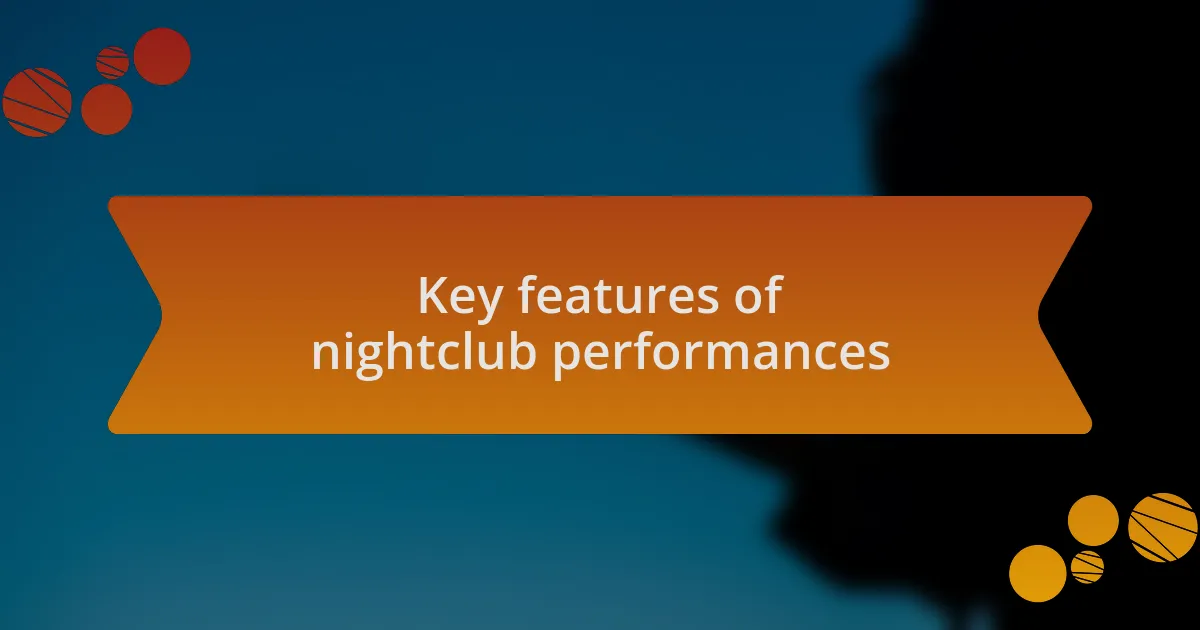
Key features of nightclub performances
Key features of nightclub performances often revolve around the ambiance and connection between the artist and the audience. I vividly remember the electric atmosphere during a late-night set where the lights pulsed in sync with the beats, creating a sensory experience that felt almost transcendent. It’s those moments when the crowd sways together, creating a collective energy that elevates the performance itself.
Another significant aspect is the spontaneity and improvisation that can come to life during these shows. There was a time when a DJ dropped an unexpected mashup, and the room erupted with excitement, as individuals found a shared rhythm that pulsed through them. Isn’t it fascinating how nightlife encourages artists to take bold risks, leading to unforgettable performances that feel genuinely alive?
The intimacy of nightclub settings allows for a unique level of engagement between performers and attendees. I recall being in a crowd where the artist actually paused to interact with us, asking questions and encouraging us to respond. This sense of participation transforms a mere performance into a memorable experience, doesn’t it? It’s precisely this connection that makes nightclub performances so captivating.

Influential rap artists in nightclubs
The influence of rap artists in nightclubs is undeniable, as they have the power to ignite the crowd with their lyrical prowess and infectious beats. I still remember the night when a renowned rapper took to the stage, and the moment he spat that first verse, it felt like the entire room held its breath in anticipation. It’s moments like these that showcase how an artist can harness the energy of the space, creating an intimate connection that resonates deep within.
Some of the most memorable nightclub performances I’ve experienced featured artists who expertly blended their rap dynamics with the club’s electrifying atmosphere. One night, I observed a rapper who effortlessly engaged the audience, encouraging them to chant along with his hooks. It struck me how this interaction not only elevated his performance but also forged a sense of unity among us. How powerful is it when a performer can turn a nightclub into a collective celebration, reinforcing the role of rap as a voice for the people?
VIP sections and bottle service aside, the real magic happens on the dance floor when influential rap artists drop tracks that make the crowd move. I recall a specific evening where a legend in the rap game performed exclusive remixes, and it felt like the very fabric of the nightclub pulsed with each beat. Isn’t it remarkable how a single artist can transform an ordinary night into an unforgettable experience, resonating with both seasoned fans and newcomers alike?
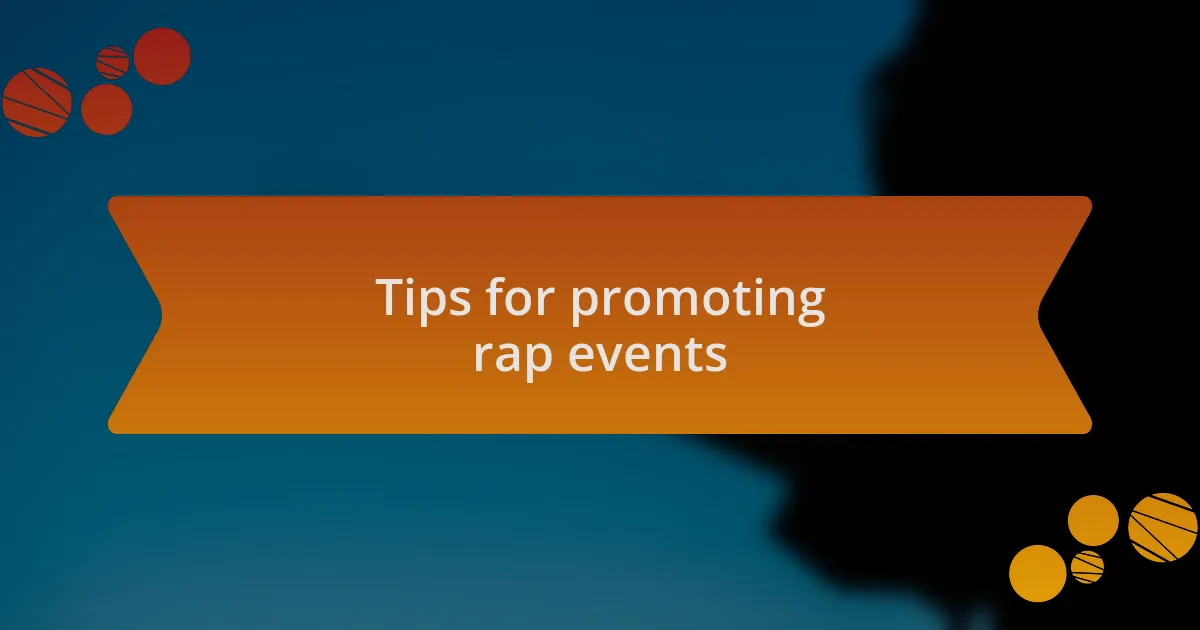
Tips for promoting rap events
To effectively promote rap events, leveraging social media is key. I’ve found that platforms like Instagram and TikTok can create a buzz around an event in a way that feels both organic and vibrant. When I posted behind-the-scenes clips of a rehearsal for a local rap show, the excitement from followers was palpable, sparking conversations and sharing that significantly boosted attendance.
Another strategy is to collaborate with local influencers or well-known artists who resonate with your target audience. I recall reaching out to an up-and-coming rapper who had a solid following and invited him to host the event. His energy transformed our promotional efforts, as his fans rallied around him, eager to support his involvement. It’s interesting how a simple connection can amplify reach and inject fresh enthusiasm into your event.
Don’t underestimate the power of creating an immersive experience beyond just the music. I once attended a rap event that featured live art and interactive installations, making it unforgettable. Engaging attendees in unique ways not only captivates their attention but also turns them into advocates of your event. How often do you find yourself raving about an experience that transcends the music? That’s what you want your audience to feel—pure exhilaration!
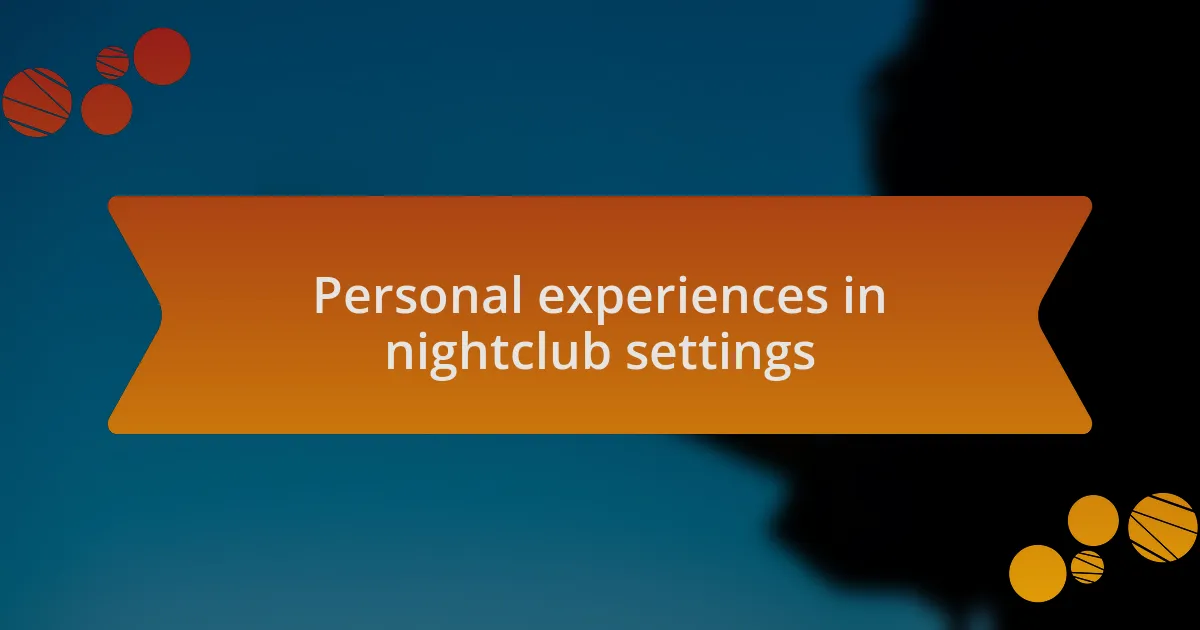
Personal experiences in nightclub settings
Stepping into a nightclub often feels like entering a different world, where the energy is palpable and the beats draw you in. I remember one night when the moment the DJ dropped the first rap track, the crowd erupted with a collective joy that was almost tangible. It made me realize how powerful music is in forging connections and lifting our spirits, doesn’t it?
I’ve had nights where the vibe was perfect—friends dancing and laughing, and every track weaving together like the soundtrack of our lives. A particularly memorable experience was when a local rapper premiered his new song. The thrill of being part of that moment, witnessing not just a performance but a celebration of creativity, was unforgettable. It left me pondering how shared experiences in such settings can foster community, don’t you think?
In my experience, the best nights are those that surprise you. One evening, while waiting for the headliner to perform, I stumbled upon an impromptu rap battle among some of the audience members. The raw talent and spontaneity added a layer of excitement that transformed a simple night out into something extraordinary. Those are the moments that stick with you—reminding me of how nightlife isn’t just about the music; it’s about the stories and connections we create along the way.
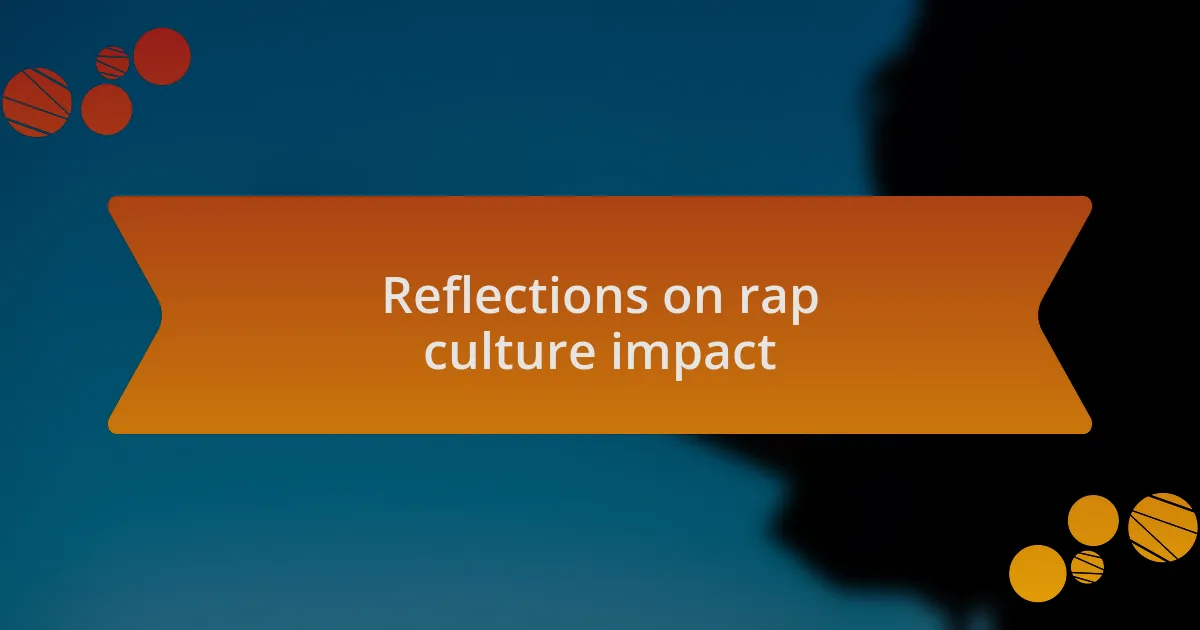
Reflections on rap culture impact
Rap culture has profoundly influenced not just music but societal dynamics as well. I remember attending a show where the artist used his platform to address social issues, sparking conversations among the audience during the setbreak. It dawned on me that rap is often a reflection of the times, weaving personal narratives into a broader social commentary, making it a powerful catalyst for change.
In nightclub settings, the way rap music can elevate the atmosphere is truly astonishing. I recall a night when a particularly fiery verse resonated with the crowd, and the energy in the room shifted. Suddenly, it was as if we were all sharing an unspoken bond, united by the raw emotions conveyed through the lyrics. Isn’t it amazing how music can create such an immediate and palpable connection among strangers?
Moreover, the inclusivity of rap culture has always struck me. During one of my nights out, I found myself surrounded by a diverse group of people, all vibing to a classic track from a legendary artist. It reminded me that rap breaks barriers, allowing individuals from all walks of life to come together, celebrating their love for the music. It made me reflect on how vital this inclusivity is in our increasingly divided world.